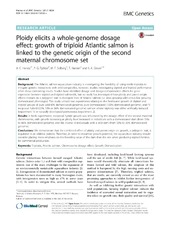Ploidy elicits a whole-genome dosage effect: growth of triploid Atlantic salmon is linked to the genetic origin of the second maternal chromosome set
Harvey, Alison C.; Fjelldal, Per Gunnar; Solberg, Monica Favnebøe; Hansen, Tom Johnny; Glover, Kevin
Peer reviewed, Journal article
Published version

Åpne
Permanent lenke
https://hdl.handle.net/1956/17926Utgivelsesdato
2017-04-11Metadata
Vis full innførselSamlinger
Originalversjon
https://doi.org/10.1186/s12863-017-0502-xSammendrag
Background: The Atlantic salmon aquaculture industry is investigating the feasibility of using sterile triploids to mitigate genetic interactions with wild conspecifics, however, studies investigating diploid and triploid performance often show contrasting results. Studies have identified dosage and dosage-compensation effects for gene expression between triploid and diploid salmonids, but no study has investigated how ploidy and parent-origin effects interact on a polygenic trait in divergent lines of Atlantic salmon (i.e. slow growing wild versus fast growing domesticated phenotype). This study utilised two experiments relating to the freshwater growth of diploid and triploid groups of pure wild (0% domesticated genome), pure domesticated (100% domesticated genome), and F1 reciprocal hybrid (33%, 50% or 66% domesticated genome) salmon where triploidy was either artificially induced (experiment 1) or naturally developed/spontaneous (experiment 2). Results: In both experiments, reciprocal hybrid growth was influenced by the dosage effect of the second maternal chromosome, with growth increasing as ploidy level increased in individuals with a domesticated dam (from 50% to 66% domesticated genome), and the inverse in individuals with a wild dam (from 50% to 33% domesticated genome). Conclusions: We demonstrate that the combined effect of ploidy and parent-origin on growth, a polygenic trait, is regulated in an additive pattern. Therefore, in order to maximise growth potential, the aquaculture industry should consider placing more emphasis on the breeding value of the dam than the sire when producing triploid families for commercial production
